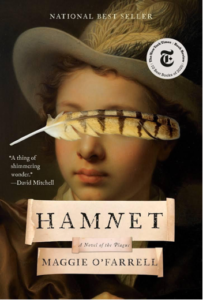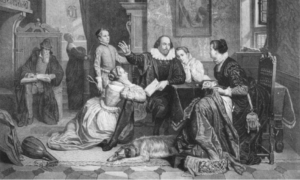
Hamnet: A Novel of the Plague
By Maggie O’Farrell
384 pages
Published in 2020 by Tinder Press
Hamnet is, as the title suggests, a book about Shakespeare’s son and the plague that killed him. It is also a vivid depiction of England – its culture and its economy – during Elizabeth’s reign. It is, perhaps most of all, a compelling portrait of Agnes, Hamnet’s mother and Shakespeare’s wife.
And finally, it is a brilliantly imagined explanation of how Shakespeare came to write Hamlet, his greatest tragedy (with the possible exception of King Lear).

Shakespeare and family. Hamnet is standing on the left.
What historical fiction like Hamnet does is help fill in the factual blanks with inventive imaginings. And there is so much of that in this book.
If you are a student of Shakespeare, you will love it. If you are not, you may love it too, because of the prose and the storytelling. And if you don’t know anything about Shakespeare’s life, you will enhance your enjoyment of Hamnet by spending a little time reading a summary of it in Wikipedia.
Interesting Facts
* Hamlet and Hamnet were variations of the same name. In the 16th century, English orthography had not yet been formalized. One example: There are something like 6 authenticated signatures by Shakespeare, only 2 of which have the same spelling.
* Maggie O’Farrell won the London Women’s Prize for Fiction (along with £30,000) for Hamnet.
* Hamnet was one of The New York Times’ 10 Best Books of 2020.
Critical Reviews
* “Maggie O’Farrell’s writing is intensely detailed and descriptive, allowing the reader to become encapsulated into the world of Elizabethan England. Her extensive research is evidenced throughout and makes for a really absorbing and enjoyable read.” (Off The Record)
* “Of all the stories that argue and speculate about Shakespeare’s life… here is a novel… so gorgeously written that it transports you.” (Boston Globe)
* “O’Farrell brilliantly turns to historical fiction to confront a parent’s worst nightmare: the death of a child…. Hamnet vividly captures the life-changing intensity of maternity in its myriad stages – from the pain of childbirth to the unassuageable grief of loss.” (NPR)
